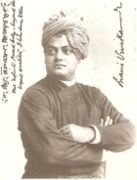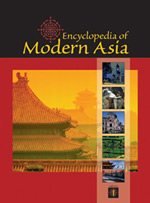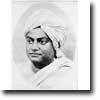| |
 Swami Vivekananda (Bengali: Swami Vivekananda (Bengali: 
Shami Bibekanondo), whose pre-monastic name was Narendranath Dutta
 Nôrendronath Dotto, was one of the critical figures in the history of Hinduism, India and Eastern thought in the West. Prior to his becoming world famous as Vivekananda - as a wandering and obscure monk he was known also as Swami Vividishananda and Swami Sacchidananda). He was affectionately known, even in his later years, by those who knew him in his youth, as Naren. (January 12, 1863 - July 4, 1902) Vivekananda was one of the most famous and influential spiritual leaders of the philosophies of Vedanta and Yoga. He was the first known Hindu Swami to come to the West, where he introduced Hinduism, Yoga and Vedanta at the World's Parliament of Religions, in Connection with the World's Fair in Chicago, in 1893. It was there that he was catapulted to almost instant international fame by his powerful presence and enthusiastic reception by wide audiences in Chicago and then later elsewhere in America. He was the chief disciple of Ramakrishna Paramahamsa and the founder of Ramakrishna Math and Ramakrishna Mission. Many consider him an icon for fearless courage, chastity, exhortations to upright youth, (National Youth Day in India is by way of commemorating him- held on his birthday- January 12) broad outlook on social problems, solicitude for women's rights and responsibilities, and for men - his gospel of man-making - by which he is credited, by many, with raising the nation of India. Every one of the 20th century Indian leaders of note- have acknowledged his influence-- from Gandhi to Subash Bose. The first Governor general of Independent India - Rajagopalachari said "Vivekananda saved Hinduism." Bose said Vivekananda "is the maker of modern India" Gandhi said Vivekananda's influence increased his "love for his country a thousand fold." His manly approach to nation-making and his much-heralded success preaching Vedanta and Yoga in America and England, vivified India and gave them a renewed sense of self-worth- in a day when English Imperialism had robbed the nation of its poltical independence, its wealth, and its religion -with Christian missionaries infiltrating the land with their message that Hinduism was inferior since India was conquered by military might -- a subject land. While he is widely credited with having uplifted his own nation, simultaneously he introduced Yoga and Vedanta to America and England with his popular lectures and private discourses on Vedanta philosophy. The list of distinguished admirers and disciples he had in America are impressive indeed. And of course he is the father of Indian expatriation to the west, having opened the doors to what is now one of the leading and most prosperous ethnicities to proudly come to America. Of course, in his day there was hardly a Hindu in America and he recieved an immense amount of criticism for crossing the ocean- which at that time was a cause for "outcasting." Vivekananda scoffed at the cavil and sneering of the orthodox saying "I cannot be outcasted - As a monk, I am beyond caste." In any event, one man, in a span of 39 years - 1. was the catalyst for the making of the great and powerful nation of India, 2. is credited by many as having saved his religion from extinction, (the rate of conversion of Hindus to Christianity significantly slowed after his smashing success in America was reported in what was then "benighted India" and the flow of money to Christian missionaries- from America was significantly reduced after seeing a "specimen of the unsaved that was more spiritual than all their parsons put together." (-Hiram Maxim) 3. Successsfully introduced yoga and vedanta to the west where it has flourished to this day (he wrote the first published books on yoga in the west, which were well received and critically acclaimed, and lectured around America introducing the topic (1894-6). Later, significantly, taught hundreds of students privately in free classes held in his own room beginning in NY in 1895) 4. Inculcated a spirit of respect and good will between the east and the west (he had American disciples he brought to India and initiated as Swamis and brought Indian Swamis to America where they and their successors have been ever since) 5. Founded one of the most significant and largest monastic orders in India, The Ramakrishna order of Monks (named after his guru Ramakrishna Paramahansa)-and whereby he, factually, reorganized the ancient Swami order. 5. Founded one of the world's largest charitable relief missions (the Ramakrishna Mission). 6. Left a lasting body of philosophical works (see Vivekananda's complete works) which Vedic scholar Frank Parlato has called, "the greatest comprehensive work in philosophy ever published." 7. A mystic of the highest order, he presented to the world an example of an active saint, of, again, according to Parlato, "unblemished chastity, with genuine glimpses of superconcsciousness, in full control of his will and mind, at all times manly and courageous, and who declared it the birthright of everyone - from the outcaste - to the highest born. In short the examplar of a stronger and greater humanity. In effect, a superman - with boundless love for humanity." Today Vivekananda is literally worshiped as a god or diety, the incarnation of the Hindu God Shiva in an estimated 20 million homes in India. His collosal all -India monument - which is placed significantly at Vivekananda rock- literally the southernmost tip of India -shows the esteem in which he is held by his countrymen. Vivekananda himself on the eve of his death declared, "let the world try to understand what I have done. It will take them a quite a long time to do that." It may be argued that Vivekananda's impact on the world, after only little more than a century after his death, rivals that of the greatest historical figures of the 19th century. It is possible that in a century or two more, his impact may be seen as rivaling that of the greatest figures our history of humankind have ever known. Nôrendronath Dotto, was one of the critical figures in the history of Hinduism, India and Eastern thought in the West. Prior to his becoming world famous as Vivekananda - as a wandering and obscure monk he was known also as Swami Vividishananda and Swami Sacchidananda). He was affectionately known, even in his later years, by those who knew him in his youth, as Naren. (January 12, 1863 - July 4, 1902) Vivekananda was one of the most famous and influential spiritual leaders of the philosophies of Vedanta and Yoga. He was the first known Hindu Swami to come to the West, where he introduced Hinduism, Yoga and Vedanta at the World's Parliament of Religions, in Connection with the World's Fair in Chicago, in 1893. It was there that he was catapulted to almost instant international fame by his powerful presence and enthusiastic reception by wide audiences in Chicago and then later elsewhere in America. He was the chief disciple of Ramakrishna Paramahamsa and the founder of Ramakrishna Math and Ramakrishna Mission. Many consider him an icon for fearless courage, chastity, exhortations to upright youth, (National Youth Day in India is by way of commemorating him- held on his birthday- January 12) broad outlook on social problems, solicitude for women's rights and responsibilities, and for men - his gospel of man-making - by which he is credited, by many, with raising the nation of India. Every one of the 20th century Indian leaders of note- have acknowledged his influence-- from Gandhi to Subash Bose. The first Governor general of Independent India - Rajagopalachari said "Vivekananda saved Hinduism." Bose said Vivekananda "is the maker of modern India" Gandhi said Vivekananda's influence increased his "love for his country a thousand fold." His manly approach to nation-making and his much-heralded success preaching Vedanta and Yoga in America and England, vivified India and gave them a renewed sense of self-worth- in a day when English Imperialism had robbed the nation of its poltical independence, its wealth, and its religion -with Christian missionaries infiltrating the land with their message that Hinduism was inferior since India was conquered by military might -- a subject land. While he is widely credited with having uplifted his own nation, simultaneously he introduced Yoga and Vedanta to America and England with his popular lectures and private discourses on Vedanta philosophy. The list of distinguished admirers and disciples he had in America are impressive indeed. And of course he is the father of Indian expatriation to the west, having opened the doors to what is now one of the leading and most prosperous ethnicities to proudly come to America. Of course, in his day there was hardly a Hindu in America and he recieved an immense amount of criticism for crossing the ocean- which at that time was a cause for "outcasting." Vivekananda scoffed at the cavil and sneering of the orthodox saying "I cannot be outcasted - As a monk, I am beyond caste." In any event, one man, in a span of 39 years - 1. was the catalyst for the making of the great and powerful nation of India, 2. is credited by many as having saved his religion from extinction, (the rate of conversion of Hindus to Christianity significantly slowed after his smashing success in America was reported in what was then "benighted India" and the flow of money to Christian missionaries- from America was significantly reduced after seeing a "specimen of the unsaved that was more spiritual than all their parsons put together." (-Hiram Maxim) 3. Successsfully introduced yoga and vedanta to the west where it has flourished to this day (he wrote the first published books on yoga in the west, which were well received and critically acclaimed, and lectured around America introducing the topic (1894-6). Later, significantly, taught hundreds of students privately in free classes held in his own room beginning in NY in 1895) 4. Inculcated a spirit of respect and good will between the east and the west (he had American disciples he brought to India and initiated as Swamis and brought Indian Swamis to America where they and their successors have been ever since) 5. Founded one of the most significant and largest monastic orders in India, The Ramakrishna order of Monks (named after his guru Ramakrishna Paramahansa)-and whereby he, factually, reorganized the ancient Swami order. 5. Founded one of the world's largest charitable relief missions (the Ramakrishna Mission). 6. Left a lasting body of philosophical works (see Vivekananda's complete works) which Vedic scholar Frank Parlato has called, "the greatest comprehensive work in philosophy ever published." 7. A mystic of the highest order, he presented to the world an example of an active saint, of, again, according to Parlato, "unblemished chastity, with genuine glimpses of superconcsciousness, in full control of his will and mind, at all times manly and courageous, and who declared it the birthright of everyone - from the outcaste - to the highest born. In short the examplar of a stronger and greater humanity. In effect, a superman - with boundless love for humanity." Today Vivekananda is literally worshiped as a god or diety, the incarnation of the Hindu God Shiva in an estimated 20 million homes in India. His collosal all -India monument - which is placed significantly at Vivekananda rock- literally the southernmost tip of India -shows the esteem in which he is held by his countrymen. Vivekananda himself on the eve of his death declared, "let the world try to understand what I have done. It will take them a quite a long time to do that." It may be argued that Vivekananda's impact on the world, after only little more than a century after his death, rivals that of the greatest historical figures of the 19th century. It is possible that in a century or two more, his impact may be seen as rivaling that of the greatest figures our history of humankind have ever known.
|
|

 Swami Vivekananda (Bengali:
Swami Vivekananda (Bengali:  Nôrendronath Dotto, was one of the critical figures in the history of Hinduism, India and Eastern thought in the West. Prior to his becoming world famous as Vivekananda - as a wandering and obscure monk he was known also as Swami Vividishananda and Swami Sacchidananda). He was affectionately known, even in his later years, by those who knew him in his youth, as Naren. (January 12, 1863 - July 4, 1902) Vivekananda was one of the most famous and influential spiritual leaders of the philosophies of Vedanta and Yoga. He was the first known Hindu Swami to come to the West, where he introduced Hinduism, Yoga and Vedanta at the World's Parliament of Religions, in Connection with the World's Fair in Chicago, in 1893. It was there that he was catapulted to almost instant international fame by his powerful presence and enthusiastic reception by wide audiences in Chicago and then later elsewhere in America. He was the chief disciple of Ramakrishna Paramahamsa and the founder of Ramakrishna Math and Ramakrishna Mission. Many consider him an icon for fearless courage, chastity, exhortations to upright youth, (National Youth Day in India is by way of commemorating him- held on his birthday- January 12) broad outlook on social problems, solicitude for women's rights and responsibilities, and for men - his gospel of man-making - by which he is credited, by many, with raising the nation of India. Every one of the 20th century Indian leaders of note- have acknowledged his influence-- from Gandhi to Subash Bose. The first Governor general of Independent India - Rajagopalachari said "Vivekananda saved Hinduism." Bose said Vivekananda "is the maker of modern India" Gandhi said Vivekananda's influence increased his "love for his country a thousand fold." His manly approach to nation-making and his much-heralded success preaching Vedanta and Yoga in America and England, vivified India and gave them a renewed sense of self-worth- in a day when English Imperialism had robbed the nation of its poltical independence, its wealth, and its religion -with Christian missionaries infiltrating the land with their message that Hinduism was inferior since India was conquered by military might -- a subject land. While he is widely credited with having uplifted his own nation, simultaneously he introduced Yoga and Vedanta to America and England with his popular lectures and private discourses on Vedanta philosophy. The list of distinguished admirers and disciples he had in America are impressive indeed. And of course he is the father of Indian expatriation to the west, having opened the doors to what is now one of the leading and most prosperous ethnicities to proudly come to America. Of course, in his day there was hardly a Hindu in America and he recieved an immense amount of criticism for crossing the ocean- which at that time was a cause for "outcasting." Vivekananda scoffed at the cavil and sneering of the orthodox saying "I cannot be outcasted - As a monk, I am beyond caste." In any event, one man, in a span of 39 years - 1. was the catalyst for the making of the great and powerful nation of India, 2. is credited by many as having saved his religion from extinction, (the rate of conversion of Hindus to Christianity significantly slowed after his smashing success in America was reported in what was then "benighted India" and the flow of money to Christian missionaries- from America was significantly reduced after seeing a "specimen of the unsaved that was more spiritual than all their parsons put together." (-Hiram Maxim) 3. Successsfully introduced yoga and vedanta to the west where it has flourished to this day (he wrote the first published books on yoga in the west, which were well received and critically acclaimed, and lectured around America introducing the topic (1894-6). Later, significantly, taught hundreds of students privately in free classes held in his own room beginning in NY in 1895) 4. Inculcated a spirit of respect and good will between the east and the west (he had American disciples he brought to India and initiated as Swamis and brought Indian Swamis to America where they and their successors have been ever since) 5. Founded one of the most significant and largest monastic orders in India, The Ramakrishna order of Monks (named after his guru Ramakrishna Paramahansa)-and whereby he, factually, reorganized the ancient Swami order. 5. Founded one of the world's largest charitable relief missions (the Ramakrishna Mission). 6. Left a lasting body of philosophical works (see Vivekananda's complete works) which Vedic scholar Frank Parlato has called, "the greatest comprehensive work in philosophy ever published." 7. A mystic of the highest order, he presented to the world an example of an active saint, of, again, according to Parlato, "unblemished chastity, with genuine glimpses of superconcsciousness, in full control of his will and mind, at all times manly and courageous, and who declared it the birthright of everyone - from the outcaste - to the highest born. In short the examplar of a stronger and greater humanity. In effect, a superman - with boundless love for humanity." Today Vivekananda is literally worshiped as a god or diety, the incarnation of the Hindu God Shiva in an estimated 20 million homes in India. His collosal all -India monument - which is placed significantly at Vivekananda rock- literally the southernmost tip of India -shows the esteem in which he is held by his countrymen. Vivekananda himself on the eve of his death declared, "let the world try to understand what I have done. It will take them a quite a long time to do that." It may be argued that Vivekananda's impact on the world, after only little more than a century after his death, rivals that of the greatest historical figures of the 19th century. It is possible that in a century or two more, his impact may be seen as rivaling that of the greatest figures our history of humankind have ever known.
Nôrendronath Dotto, was one of the critical figures in the history of Hinduism, India and Eastern thought in the West. Prior to his becoming world famous as Vivekananda - as a wandering and obscure monk he was known also as Swami Vividishananda and Swami Sacchidananda). He was affectionately known, even in his later years, by those who knew him in his youth, as Naren. (January 12, 1863 - July 4, 1902) Vivekananda was one of the most famous and influential spiritual leaders of the philosophies of Vedanta and Yoga. He was the first known Hindu Swami to come to the West, where he introduced Hinduism, Yoga and Vedanta at the World's Parliament of Religions, in Connection with the World's Fair in Chicago, in 1893. It was there that he was catapulted to almost instant international fame by his powerful presence and enthusiastic reception by wide audiences in Chicago and then later elsewhere in America. He was the chief disciple of Ramakrishna Paramahamsa and the founder of Ramakrishna Math and Ramakrishna Mission. Many consider him an icon for fearless courage, chastity, exhortations to upright youth, (National Youth Day in India is by way of commemorating him- held on his birthday- January 12) broad outlook on social problems, solicitude for women's rights and responsibilities, and for men - his gospel of man-making - by which he is credited, by many, with raising the nation of India. Every one of the 20th century Indian leaders of note- have acknowledged his influence-- from Gandhi to Subash Bose. The first Governor general of Independent India - Rajagopalachari said "Vivekananda saved Hinduism." Bose said Vivekananda "is the maker of modern India" Gandhi said Vivekananda's influence increased his "love for his country a thousand fold." His manly approach to nation-making and his much-heralded success preaching Vedanta and Yoga in America and England, vivified India and gave them a renewed sense of self-worth- in a day when English Imperialism had robbed the nation of its poltical independence, its wealth, and its religion -with Christian missionaries infiltrating the land with their message that Hinduism was inferior since India was conquered by military might -- a subject land. While he is widely credited with having uplifted his own nation, simultaneously he introduced Yoga and Vedanta to America and England with his popular lectures and private discourses on Vedanta philosophy. The list of distinguished admirers and disciples he had in America are impressive indeed. And of course he is the father of Indian expatriation to the west, having opened the doors to what is now one of the leading and most prosperous ethnicities to proudly come to America. Of course, in his day there was hardly a Hindu in America and he recieved an immense amount of criticism for crossing the ocean- which at that time was a cause for "outcasting." Vivekananda scoffed at the cavil and sneering of the orthodox saying "I cannot be outcasted - As a monk, I am beyond caste." In any event, one man, in a span of 39 years - 1. was the catalyst for the making of the great and powerful nation of India, 2. is credited by many as having saved his religion from extinction, (the rate of conversion of Hindus to Christianity significantly slowed after his smashing success in America was reported in what was then "benighted India" and the flow of money to Christian missionaries- from America was significantly reduced after seeing a "specimen of the unsaved that was more spiritual than all their parsons put together." (-Hiram Maxim) 3. Successsfully introduced yoga and vedanta to the west where it has flourished to this day (he wrote the first published books on yoga in the west, which were well received and critically acclaimed, and lectured around America introducing the topic (1894-6). Later, significantly, taught hundreds of students privately in free classes held in his own room beginning in NY in 1895) 4. Inculcated a spirit of respect and good will between the east and the west (he had American disciples he brought to India and initiated as Swamis and brought Indian Swamis to America where they and their successors have been ever since) 5. Founded one of the most significant and largest monastic orders in India, The Ramakrishna order of Monks (named after his guru Ramakrishna Paramahansa)-and whereby he, factually, reorganized the ancient Swami order. 5. Founded one of the world's largest charitable relief missions (the Ramakrishna Mission). 6. Left a lasting body of philosophical works (see Vivekananda's complete works) which Vedic scholar Frank Parlato has called, "the greatest comprehensive work in philosophy ever published." 7. A mystic of the highest order, he presented to the world an example of an active saint, of, again, according to Parlato, "unblemished chastity, with genuine glimpses of superconcsciousness, in full control of his will and mind, at all times manly and courageous, and who declared it the birthright of everyone - from the outcaste - to the highest born. In short the examplar of a stronger and greater humanity. In effect, a superman - with boundless love for humanity." Today Vivekananda is literally worshiped as a god or diety, the incarnation of the Hindu God Shiva in an estimated 20 million homes in India. His collosal all -India monument - which is placed significantly at Vivekananda rock- literally the southernmost tip of India -shows the esteem in which he is held by his countrymen. Vivekananda himself on the eve of his death declared, "let the world try to understand what I have done. It will take them a quite a long time to do that." It may be argued that Vivekananda's impact on the world, after only little more than a century after his death, rivals that of the greatest historical figures of the 19th century. It is possible that in a century or two more, his impact may be seen as rivaling that of the greatest figures our history of humankind have ever known.



